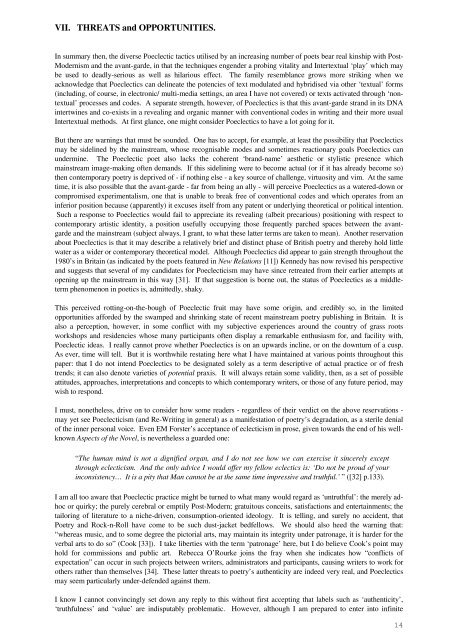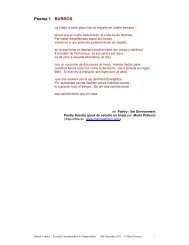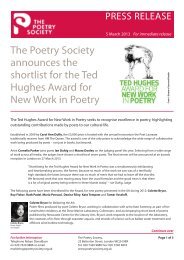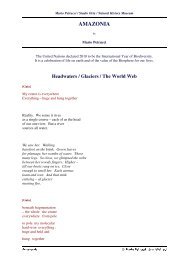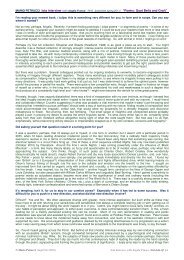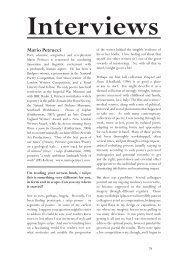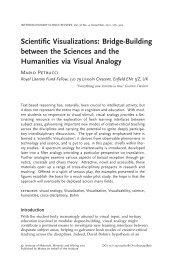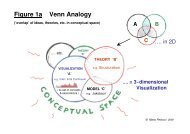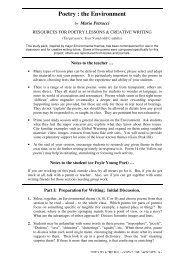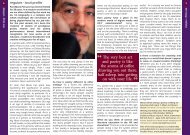poetry in performance: intertextuality, intra-textuality ... - Mario Petrucci
poetry in performance: intertextuality, intra-textuality ... - Mario Petrucci
poetry in performance: intertextuality, intra-textuality ... - Mario Petrucci
Create successful ePaper yourself
Turn your PDF publications into a flip-book with our unique Google optimized e-Paper software.
VII. THREATS and OPPORTUNITIES.<br />
In summary then, the diverse Poeclectic tactics utilised by an <strong>in</strong>creas<strong>in</strong>g number of poets bear real k<strong>in</strong>ship with Post-<br />
Modernism and the avant-garde, <strong>in</strong> that the techniques engender a prob<strong>in</strong>g vitality and Intertextual ‘play’ which may<br />
be used to deadly-serious as well as hilarious effect. The family resemblance grows more strik<strong>in</strong>g when we<br />
acknowledge that Poeclectics can del<strong>in</strong>eate the potencies of text modulated and hybridised via other ‘textual’ forms<br />
(<strong>in</strong>clud<strong>in</strong>g, of course, <strong>in</strong> electronic/ multi-media sett<strong>in</strong>gs, an area I have not covered) or texts activated through ‘nontextual’<br />
processes and codes. A separate strength, however, of Poeclectics is that this avant-garde strand <strong>in</strong> its DNA<br />
<strong>in</strong>tertw<strong>in</strong>es and co-exists <strong>in</strong> a reveal<strong>in</strong>g and organic manner with conventional codes <strong>in</strong> writ<strong>in</strong>g and their more usual<br />
Intertextual methods. At first glance, one might consider Poeclectics to have a lot go<strong>in</strong>g for it.<br />
But there are warn<strong>in</strong>gs that must be sounded. One has to accept, for example, at least the possibility that Poeclectics<br />
may be sidel<strong>in</strong>ed by the ma<strong>in</strong>stream, whose recognisable modes and sometimes reactionary goals Poeclectics can<br />
underm<strong>in</strong>e. The Poeclectic poet also lacks the coherent ‘brand-name’ aesthetic or stylistic presence which<br />
ma<strong>in</strong>stream image-mak<strong>in</strong>g often demands. If this sidel<strong>in</strong><strong>in</strong>g were to become actual (or if it has already become so)<br />
then contemporary <strong>poetry</strong> is deprived of - if noth<strong>in</strong>g else - a key source of challenge, virtuosity and vim. At the same<br />
time, it is also possible that the avant-garde - far from be<strong>in</strong>g an ally - will perceive Poeclectics as a watered-down or<br />
compromised experimentalism, one that is unable to break free of conventional codes and which operates from an<br />
<strong>in</strong>ferior position because (apparently) it excuses itself from any patent or underly<strong>in</strong>g theoretical or political <strong>in</strong>tention.<br />
Such a response to Poeclectics would fail to appreciate its reveal<strong>in</strong>g (albeit precarious) position<strong>in</strong>g with respect to<br />
contemporary artistic identity, a position usefully occupy<strong>in</strong>g those frequently parched spaces between the avantgarde<br />
and the ma<strong>in</strong>stream (subject always, I grant, to what these latter terms are taken to mean). Another reservation<br />
about Poeclectics is that it may describe a relatively brief and dist<strong>in</strong>ct phase of British <strong>poetry</strong> and thereby hold little<br />
water as a wider or contemporary theoretical model. Although Poeclectics did appear to ga<strong>in</strong> strength throughout the<br />
1980’s <strong>in</strong> Brita<strong>in</strong> (as <strong>in</strong>dicated by the poets featured <strong>in</strong> New Relations [11]) Kennedy has now revised his perspective<br />
and suggests that several of my candidates for Poeclecticism may have s<strong>in</strong>ce retreated from their earlier attempts at<br />
open<strong>in</strong>g up the ma<strong>in</strong>stream <strong>in</strong> this way [31]. If that suggestion is borne out, the status of Poeclectics as a middleterm<br />
phenomenon <strong>in</strong> poetics is, admittedly, shaky.<br />
This perceived rott<strong>in</strong>g-on-the-bough of Poeclectic fruit may have some orig<strong>in</strong>, and credibly so, <strong>in</strong> the limited<br />
opportunities afforded by the swamped and shr<strong>in</strong>k<strong>in</strong>g state of recent ma<strong>in</strong>stream <strong>poetry</strong> publish<strong>in</strong>g <strong>in</strong> Brita<strong>in</strong>. It is<br />
also a perception, however, <strong>in</strong> some conflict with my subjective experiences around the country of grass roots<br />
workshops and residencies whose many participants often display a remarkable enthusiasm for, and facility with,<br />
Poeclectic ideas. I really cannot prove whether Poeclectics is on an upwards <strong>in</strong>cl<strong>in</strong>e, or on the downturn of a cusp.<br />
As ever, time will tell. But it is worthwhile restat<strong>in</strong>g here what I have ma<strong>in</strong>ta<strong>in</strong>ed at various po<strong>in</strong>ts throughout this<br />
paper: that I do not <strong>in</strong>tend Poeclectics to be designated solely as a term descriptive of actual practice or of fresh<br />
trends; it can also denote varieties of potential praxis. It will always reta<strong>in</strong> some validity, then, as a set of possible<br />
attitudes, approaches, <strong>in</strong>terpretations and concepts to which contemporary writers, or those of any future period, may<br />
wish to respond.<br />
I must, nonetheless, drive on to consider how some readers - regardless of their verdict on the above reservations -<br />
may yet see Poeclecticism (and Re-Writ<strong>in</strong>g <strong>in</strong> general) as a manifestation of <strong>poetry</strong>’s degradation, as a sterile denial<br />
of the <strong>in</strong>ner personal voice. Even EM Forster’s acceptance of eclecticism <strong>in</strong> prose, given towards the end of his wellknown<br />
Aspects of the Novel, is nevertheless a guarded one:<br />
“The human m<strong>in</strong>d is not a dignified organ, and I do not see how we can exercise it s<strong>in</strong>cerely except<br />
through eclecticism. And the only advice I would offer my fellow eclectics is: ‘Do not be proud of your<br />
<strong>in</strong>consistency… It is a pity that Man cannot be at the same time impressive and truthful.’ ” ([32] p.133).<br />
I am all too aware that Poeclectic practice might be turned to what many would regard as ‘untruthful’: the merely adhoc<br />
or quirky; the purely cerebral or emptily Post-Modern; gratuitous conceits, satisfactions and enterta<strong>in</strong>ments; the<br />
tailor<strong>in</strong>g of literature to a niche-driven, consumption-oriented ideology. It is tell<strong>in</strong>g, and surely no accident, that<br />
Poetry and Rock-n-Roll have come to be such dust-jacket bedfellows. We should also heed the warn<strong>in</strong>g that:<br />
“whereas music, and to some degree the pictorial arts, may ma<strong>in</strong>ta<strong>in</strong> its <strong>in</strong>tegrity under patronage, it is harder for the<br />
verbal arts to do so” (Cook [33]). I take liberties with the term ‘patronage’ here, but I do believe Cook’s po<strong>in</strong>t may<br />
hold for commissions and public art. Rebecca O’Rourke jo<strong>in</strong>s the fray when she <strong>in</strong>dicates how “conflicts of<br />
expectation” can occur <strong>in</strong> such projects between writers, adm<strong>in</strong>istrators and participants, caus<strong>in</strong>g writers to work for<br />
others rather than themselves [34]. These latter threats to <strong>poetry</strong>’s authenticity are <strong>in</strong>deed very real, and Poeclectics<br />
may seem particularly under-defended aga<strong>in</strong>st them.<br />
I know I cannot conv<strong>in</strong>c<strong>in</strong>gly set down any reply to this without first accept<strong>in</strong>g that labels such as ‘authenticity’,<br />
‘truthfulness’ and ‘value’ are <strong>in</strong>disputably problematic. However, although I am prepared to enter <strong>in</strong>to <strong>in</strong>f<strong>in</strong>ite<br />
14


